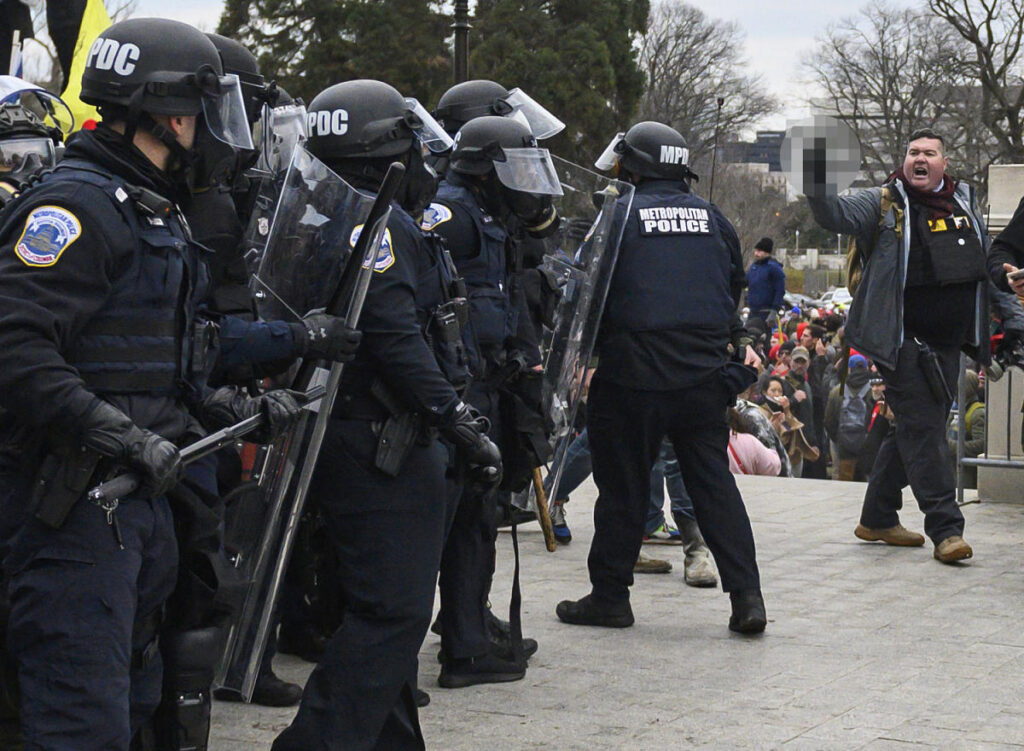On the heels of a politically charged atmosphere in Washington D.C., a Jan. 6 defendant, Russell Taylor, has drawn attention due to a letter sent by a former House member inviting him to attend the inauguration of President-elect Donald Trump. Taylor, who organized a group of participants to descend upon the Capitol during the tumultuous events of January 6, 2021, had previously pleaded guilty to obstruction of an official proceeding. He cooperated with prosecutors against associates from the Three Percenters militia group in exchange for a more lenient sentence. The incident sparked significant concern and scrutiny, especially given Taylor’s reported actions on that day, which involved leading a mob that breached police lines while armed with various weapons.
The letter, submitted by Taylor’s lawyer, Dyke E. Huish, seeks permission from U.S. District Judge Royce Lamberth for Taylor to travel to Washington with his family to attend the inauguration. Alongside the request, a letter from Chris Stewart, a former representative from Utah, was included, which highlighted that three current members of the Utah congressional delegation supported the invitation. This raises ethical questions surrounding the association of current lawmakers with individuals implicated in the Capitol riot. Huish added a note of familiarity between Taylor and Stewart, claiming they had mutual friends, which led to Stewart extending the invitation after Taylor had already served part of his sentence.
Taylor’s background and his activities on January 6 paint a troubling picture. He allegedly described himself as leading a “group of Patriots” dedicated to “functioning as operators of disruption against Tyranny.” Authorities found him heavily armed on the day of the Capitol riots, equipped with bear spray, a hatchet, and tactical gear designed for combat situations. Despite his cooperation with federal prosecutors post-charges, Taylor’s messages on the day of the attack reflect a mindset reveling in the chaos. Taylor notably mentioned “storming the Capitol,” and exuded an air of defiance, channeling a widely held belief among certain factions that the 2020 election was tainted by fraud.
The request for travel permission comes shortly after Judge Lamberth reiterated the principle of maintaining law and order in the face of the January 6 events. He emphasized the importance of a peaceful transfer of power as fundamental to American democracy, starkly contrasting with the actions taken by rioters like Taylor. Despite his illegal activities, Judge Lamberth is reported to have acknowledged Taylor’s cooperation as a case study for other defendants who recognize the gravity of their actions while still holding onto their beliefs about the election’s legitimacy. Huish articulated that Taylor had come to recognize that, while he had strong feelings about the election’s outcome, his approach had gone too far.
Furthermore, Taylor’s cooperation in trials that implicated other rioters led to several substantial sentences being handed down in connection with the Capitol events. It appears he has managed to navigate his legal repercussions and is now in compliance with probation terms. The perspective of his legal team indicates an effort to showcase him as an example of how Jan. 6 defendants can acknowledge mistakes while maintaining their partisan views, thus framing his actions within a narrative of redemption rather than solely as a criminal offense.
Donald Trump’s comments regarding the events of January 6 still resonate strongly in the political narrative, as he refers to the convicted rioters in a sympathetic light, portraying them as “patriots” and “hostages” of a legal system that has been perceived by some as unjust. The cumulative data from the U.S. Attorney’s Office indicates a significant number of individuals have been impacted by the crackdown on the riot participants, with over 1,570 people charged and hundreds sentenced to jail. This tumultuous chapter in American politics continues to raise deep-seated questions about accountability, partisanship, and the future of political discourse in the wake of the insurrection.

